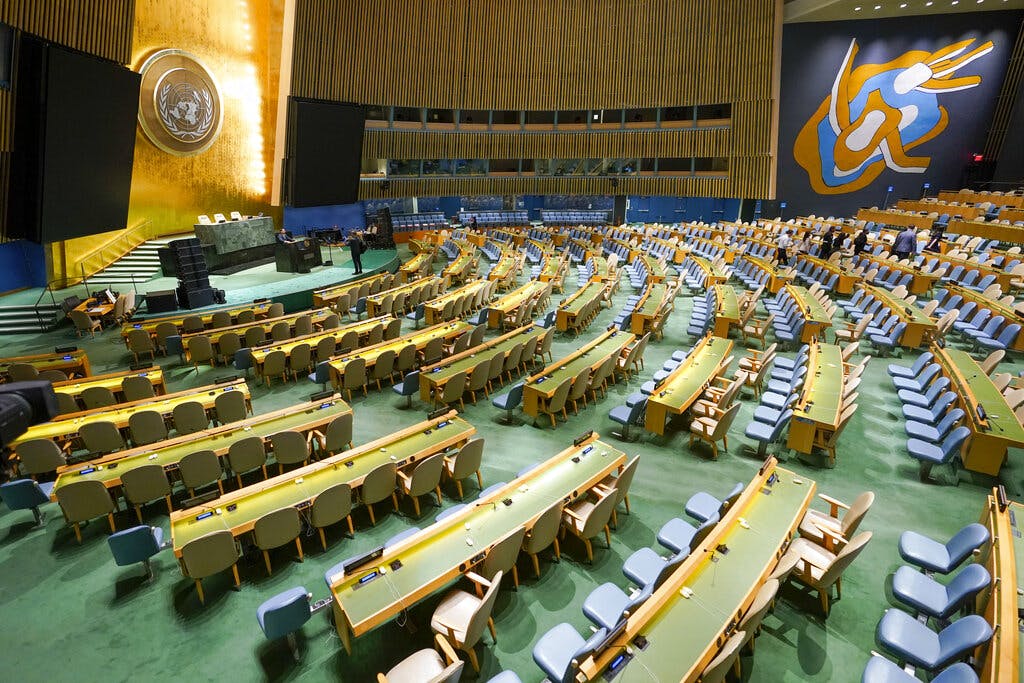This Year’s UN General Assembly Feels More Irrelevant Than Ever
The American president will be late to the proceedings due to a more prestigious funeral, and the leaders of Communist China and Russia won’t attend at all.

UNITED NATIONS — President George W. Bush once warned against turning the United Nations into an “ineffective, irrelevant debating society.” As the annual General Assembly’s debate opens tomorrow, the question is whether the UN is even that relevant.
Tradition has it that the president of America, the host country, is the second head of state to speak on the first day of the September gabfest, after Brazil. Yet, this year President Biden will miss the opening; instead he will address the assembly some time Wednesday morning — perhaps following Iran’s president.
Mr. Biden’s absence is due to a more prestigious world gathering than the General Assembly: the funeral of Queen Elizabeth II. America’s view on world affairs thus will not — at least for this UN gathering — be in the immediate forefront.
This General Assembly is not all useless: After their countries have been feuding for decades, President Erdogan of Turkey will plead with Prime Minister Lapid of Israel to close a deal on running gas through Turkey to Europe from the eastern Mediterranean. Other bilateral meetings may be used to shore up alliances and overcome disputes; in some cases, they may serve to deepen animosities.
Yet, it is historically the American president, as the leader of the free world, who delegates always wanted most to hear from and with whom they clamored for some face time. No longer. America now is part and parcel of the debating society that Mr. Bush once warned about.
The first clue that UN diplomats are at a loss to address world issues is when they start calling for “reform” of the organization itself — especially when it comes to Turtle Bay’s most prestigious organ, the Security Council: Making it more representative of today’s world than the one that existed when the UN was founded in the aftermath of WWII has long been the topic of seemingly endless debates.
After dismissing the idea for decades, America now promotes it.
“We should forge consensus around sensible and credible proposals to expand the Security Council’s membership,” America’s UN ambassador, Linda Thomas-Greenfield, told reporters last week. She promised that reforming the Security Council — where five countries, including America, have permanent, veto-wielding seats — would be high on Mr. Biden’s agenda this week.
In reality, the only way to make the UN a more effective body would be to remove the word “reform” from its vocabulary. There is a very good reason why adding others to the Permanent 5, as the veto powers are known, has failed so many times: The five powers, each for different reasons, would veto adding new members to their exclusive club.
Sure, having two European countries among the five, while other continents are unrepresented, does not well reflect the current global state of affairs, but does anyone expect Britain or France to cede their permanent seats? Also, could South Africa, Egypt, or Nigeria agree on which of them would represent their continent? How about South America? Should it be represented by Brazil, Argentina, or — for argument’s sake — Venezuela?
Then again, the 15-member Security Council is increasingly paralyzed under the leadership of the current five powers, unable to agree on anything. Expanding it would likely make it even less effective.
This reporter once suggested to a former American UN ambassador, John Bolton, that rather than expanding, shrinking the council would improve it: One rotating seat would represent each continent, and only the top world powers, China and America, would have veto power. Mr. Bolton nodded approvingly, except for one point: “Only one country should have the veto power,” he said: America.
Yet, today’s Washington is eager, at least in theory, to dilute America’s veto-wielding status in order to make the council “more representative.”
No wonder President Raisi told Leslie Stahl of “60 Minutes” last night that he doesn’t believe meeting Mr. Biden would be “beneficial.” After his administration killed a woman, Masha Amini, for not properly wearing the mandatory head cover, the Iranian president is expected to be a hot “get” for American interviewers eager to debate him over the existence of the Holocaust and such.
Unlike Messrs. Raisi and Biden, President Xi of Communist China and Russia’s president won’t even show up at Turtle Bay this week. They instead met last week at the Shanghai Forum in Uzbekistan, where Beijing promised additional financing for Russia’s Ukraine war, while Tehran vowed to resupply the Kremlin with extra killer drones.
The forum was established with the specific aim of replacing America as the guarantor of the world’s order. Its participants play hard ball while America mistakenly believes that ineffective debating societies, like Turtle Bay’s, can maintain world order.

